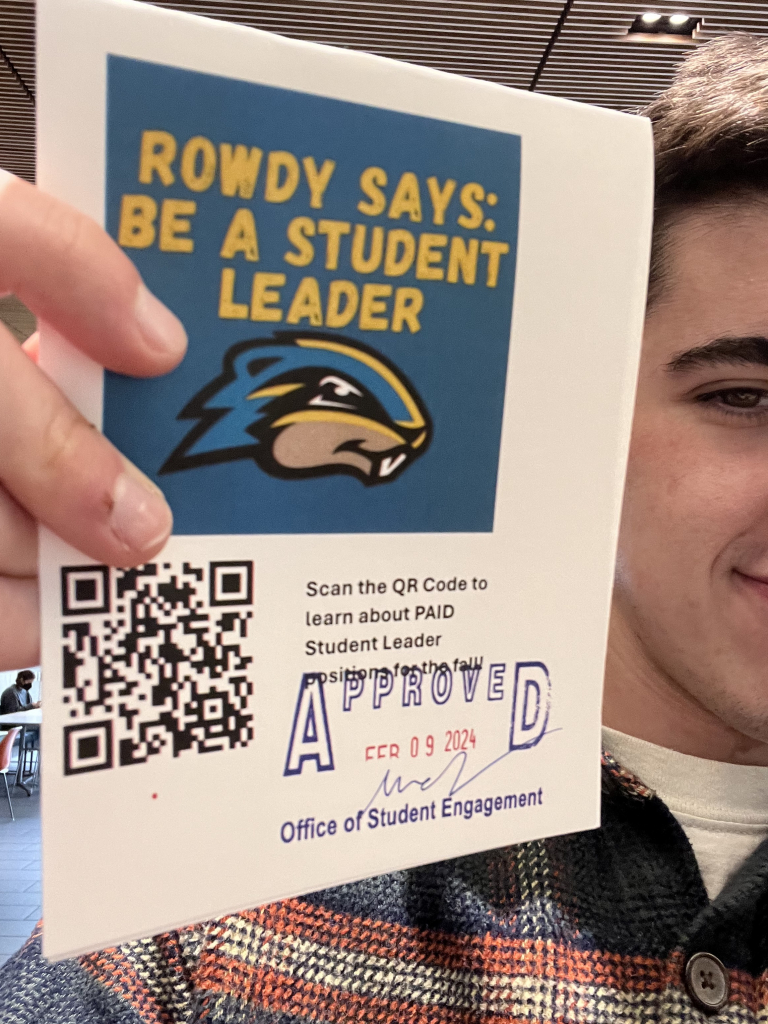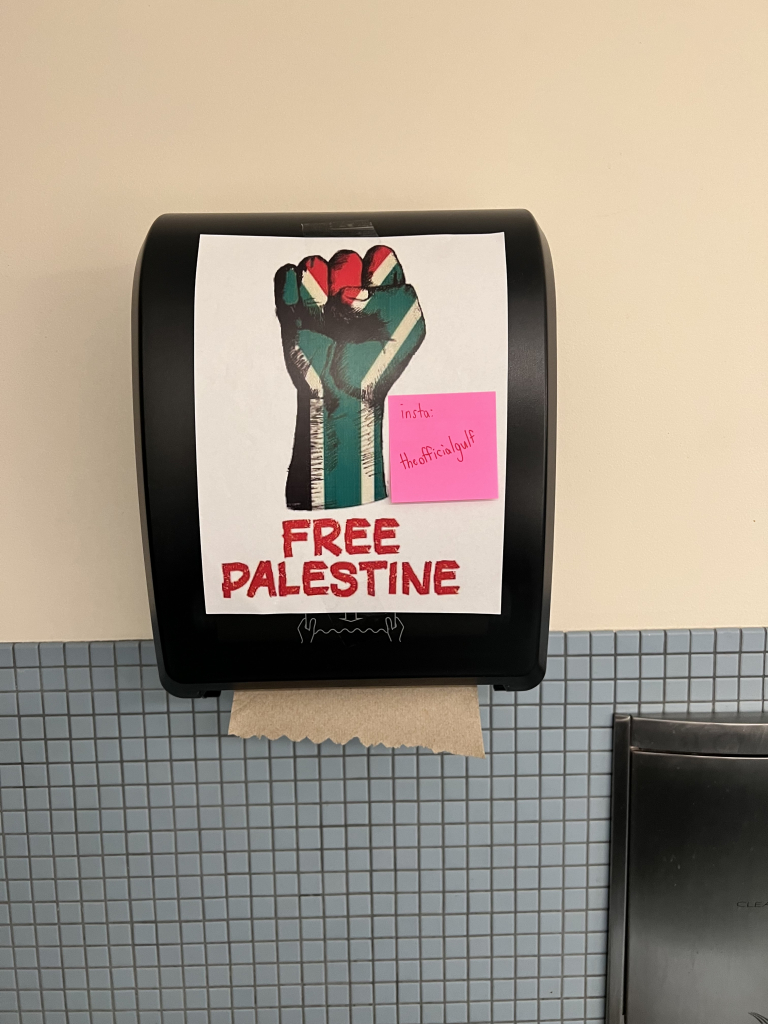Feature Image: The stamp used to denote “approved” posters. | PC: Sam Rose ’26
The 2023-24 school year brought significant changes to the Campus Demonstration Policy and the Office of Student Engagement’s reach, but some students fear that these new rules limit their ability to effectively protest and express themselves.
On October 10th, 2023, the Office of Student Affairs released an email notifying Goucher students of changes to their demonstration policy. On November 9th, 2023, President Kent Devereaux sent out a statement to the ‘Parents and Family’ section of the Goucher website, informing parents of a scheduled class walkout in support of Palestine.
This statement contained a link to the updated policy as well, and President Devereaux wrote, “As students exercise their right to free speech during the school day tomorrow, Goucher staff will be prepared to ensure that this walkout is conducted safely and respectfully, with as little disruption to normal operations as possible.”
“Normal operations” is defined in the updated campus policy as being within business days (Monday to Friday) and during business hours (9 a.m. to 5 p.m.) To summarize some of the major points of the policy, students must first request permission from the administration to stage a protest, as well as provide specifics about group size, location, duration of the event, names of sponsoring clubs (if applicable), and the date. In short, the administration requests as much information about any tentative protest as possible.
The guidelines also offer approved locations where demonstrations have to occur, which is limited to Dorsey Lawn, Great Lawn, “spaces where classes or private meetings are not being held or immediately scheduled to be held,” Van Meter Highway, and Welsh Patio. To utilize any other locations, students must submit a written request to the Dean of Students and AVP for Student Well-Being, the AVP for Human Resources, or what is referred to as “designees.”
Zev Israel ‘26 opposes how student demonstration is being addressed.
“I think it’s an insane policy, I think the idea that this should be passed off as normal is worrying. I don’t want to say it’s an abuse, but I think that if this were a public school, it would be passed off as a First Amendment violation,” she said.
“I think it’s in misalignment with any type of value around education.”
One of the most significant parts of the new demonstration policy is its crackdown on signage, posters, and flyers. The tail end of the Fall 2023 semester saw a dramatic increase in student-made posters across campus, including art pieces in support of Palestine. A large array of posters was distributed through academic buildings, including a piece from an anonymous student artist known as @decadesandoceans on Instagram. These posters were taken down by Campus Safety shortly after they were put up in the early morning before classes. All subsequent art pieces were also removed by campus safety, including sidewalk chalk on Van Meter Highway. For more context, see past coverage via The Quindecim.
Going forward, many other political posters were removed, whether this was done primarily by students or the administration is unclear. While “literature and other printed materials may be distributed in the above-mentioned permissible locations,” posters and flyers are not considered literature by this policy.

At the start of the Spring 2024 semester, another email was sent out, reminding students about the changes to the policy. Starting this semester, many students noticed that posters for clubs and activities in locations like Mary Fisher Dining Hall and outside the Student Market were being removed. The posters that were not being removed had received a stamp from the Office of Student Engagement, citing that the posters had been approved by them. The Office of Student Engagement (OSE) has not issued a formal statement informing the student body of this change, rather, it has taken to removing posters without any notice to the clubs or individuals who have posted them.
An anonymous affiliate of the Office of Student Engagement remarked on the removals and policies, saying, “It’s going to make students feel less welcome in hosting their own events.”
This individual also wished to make clear that student employees are not responsible for the changes to the guidelines and do not influence what OSE decides to do with postings on campus.
When contacted for comment, Erica Gardner, Director of Student Engagement, did not wish to provide a quote.
She did provide an excerpt from the OSE – RSO – RSO Advisor Handbook on the matter of posters or promoting and enforcement of these guidelines. The handbook excerpt outlines that any material posted on campus cannot relate to violence, offensive language, nudity or pornographic content, which is standard practice for most college campuses and private spaces.
When it comes to posters being removed and approved, the handbook states the following:
- i. Postings include, but are not limited to posters, flyers, table tents, window clings, and promotional materials.
- ii. All Registered Student Organization (RSO) postings must be stamped and approved by OSE prior to copying and posting.
- iii. Window postings need approval from the Office of Student Engagement (OSE).
- iv. Expired postings must be removed within forty-eight (48) hours of the event date that is included on the posting.
Gardner noted that the handbook is a changing document. Similarly, the Campus Demonstration Policy is also stated as being under review and subject to changes, as the Office of the Associate Provost for Undergraduate Students communicated in an email to students on January 29th, 2024.
Observing the location of posters on campus, posters in academic buildings, and in more private spaces like bathrooms and dorms seem unaffected by OSE’s crackdown on unapproved flyers and material. Mary Fisher Dining Hall is one of the most high-traffic areas on campus, as well as near OSE’s office.

While this could be viewed as a way to regulate events and activities on campus, having to approve political material or protest material could risk discouraging student activism on campus, students fear. Small campus groups like Seltzer Club, a newly chartered club that plans to host seltzer tasting and reviews, Film Club, a recently re-established student group for watching movies, and The Independent Music Club with its unique flyers designs all rely on an environment that fosters student leadership, and community involvement, and a hands-off approach from the administration.
This culture is notably something that many liberal arts schools like Goucher pride themselves on, advertising themselves as a bastion of free expression and political action. It’s also worth mentioning that many students require fliers to be distributed to collect data for student projects and research via surveys, and the new guidelines could hinder this.
While public universities in the area such as UMBC do not require signage to be approved, other private universities in the same consortium as Goucher such as Washington College do require all posters to be approved by their Office of Student Engagement and follow nearly identical policies. However, Washington College’s policies on signage and events do not explicitly address demonstrations and protests having to be approved, as Goucher’s does.
While Devereaux sent an email on December 2, 2023, clarifying that Goucher College will not be withholding diplomas from students who violate the demonstration policy, the end of the policy states that violators may have to meet with the VP for Student Well-Being & Dean of Students, or may be “subject to discipline through the College’s student conduct process.” The nature of this discipline has not been further elaborated upon.
Charlie Berszoner ‘26, a history major, had the following to say about the changes:
“Every time you walk into Heubeck, right on the floor, in the main lobby, it’s the big Goucher seal on the floor. And it has the school motto, Gratia et Veritas, Grace and Truth. These new policies directly block out people who want to tell the truth, from being able to actually put up stuff on campus, to be able to communicate with other people on campus. There’s a genocide going on, but if you put up posters about that, what do you get? You get told to f*** off by the administration.”


Fantastic journalism Sam, thank you for your work!